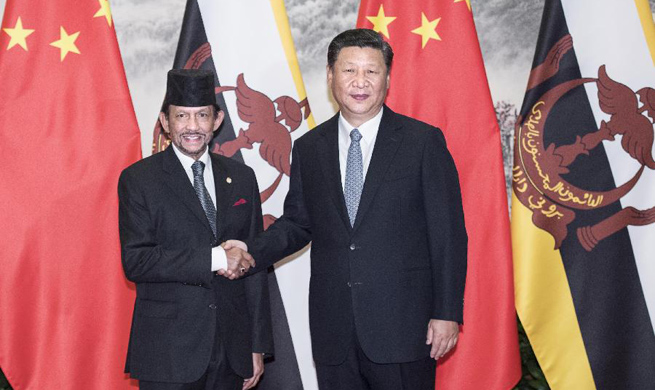RAMALLAH, Sept. 13 (Xinhua) -- The current improvement in the ties between Hamas movement and Egypt would keep the latter the sole sponsor for achieving a reconciliation that ends more than ten years of internal Palestinian split, but a breakthrough is ruled out for the short run, analysts said.
Following the ouster of former Egyptian President Mohamed Morsi in 2013, when ties between Egypt and Hamas got tensed, Cairo's role in the file of internal reconciliation had significantly retreated, despite its importance, where Egypt had almost stopped hosting delegations of Palestinian factions for this purpose.
In separate remarks, analysts told Xinhua that the recent improvement in the ties between Egypt and Hamas has strongly brought the file of internal Palestinian reconciliation back to Cairo, where this file has been previously mandated by the Arab League.
Two days ago, Hamas said it is ready to hold talks with Palestinian President Mahmoud Abbas Fatah Party to conclude a reconciliation deal. The announcement was made after Hamas delegation, headed by its politburo chief Ismail Haneya, met in Cairo with Egyptian intelligence chief Khaled Fawzi.
Abbas chaired a meeting of his Fatah Party's Central Committee in Ramallah on Tuesday, and stressed on "its keenness to have intensive and fast dialogue with the brothers in Egypt to end the Palestinian internal split."
Following the meeting, Azzam al-Ahmad, head of Fatah delegation to the dialogue with Hamas announced he will go to Cairo within few days to meet with the Egyptian leadership to follow up the efforts of ending the Palestinian division.
Ashraf Ajrami, the Ramallah-based writer and political analyst describes the developments as "positive," stressing on "the need to be reflected in concrete steps and immediate progress in the file of Palestinian reconciliation."
He told Xinhua that Hamas is required to dissolve the administrative committee it formed in the Gaza Strip months ago, without any delay, in order to halt the recent punitive measures, taken by Abbas against the Gaza Strip.
"This step will create a positive atmosphere for reconciliation and for achieving unity that the Palestinian cause is in need for, mainly in resuming the stalled peace process," said Ajrami. "There is a real reason to believe that things are changing for the better in light of the development of Egyptian relations with Hamas."
He went on saying that "this allows a greater margin for Cairo to move from the security file (on its border with the Gaza Strip) to other political files."
The internal Palestinian division began in 2007 after the Hamas violent takeover of the Gaza Strip following rounds of internal fighting with forces loyal to the Palestinian National Authority (PNA).
In response to seizing control of Gaza, President Abbas dismissed the national unity government, headed by Haneya. However, Hamas rejected the decision and kept a government that ruled the enclave.
Despite the formation of the first consensus government in June 2014 under the understandings of reconciliation reached two months earlier between a delegation from the PLO and Hamas in Gaza, it did not contribute to a practical end of split.
The consensus government kept accusing Hamas of not ruling Gaza and keeping a shadow government under its administration, while Hamas complained that the government neglected the Gaza Strip and didn't help resolving its growing crises, especially the salaries of 43,000 employees Hamas assigned since 2007.
Several months ago, Hamas form a "high committee" for running the daily affairs in the Gaza Strip, and announced that it will continue to work as long as the division exists. It insisted that it will end its work when the consensus government comes to Gaza to run the enclave's daily affairs.
In response to Hamas reject to dissolve the administrative committee, Abbas took a series of "punitive steps" against Gaza, mainly reducing the salaries of PNA employees and sending 7,000 of them to early retirement, while reducing the funding of basic services for the enclave.
Hamza Abu Shanab, a Gaza-based political analyst told Xinhua that Egypt at this stage restored "the lead" in the file of Palestinian reconciliation. He expected that Cairo will soon launch an initiative for this purpose.
Abu Shanab stresses on the importance of Egypt in moving the file of reconciliation and ending its stagnation, particularly Cairo vision is acceptable to most of the Palestinian factions and has a weight and influence on the Palestinian issue.
Abu Shanab also expects that relations between Hamas and Egypt will be strengthened in the coming stage, even if the desired progress is achieved in the reconciliation file "in the light of Hamas' keenness not to escalate with Egypt."
For his part, the political analyst from Gaza, Mustafa Ibrahim, said that Hamas "rushed" to Cairo because of the worsening crisis in Gaza and because of the increasingly difficult humanitarian situation and the need for urgent solutions.
Fatah and Hamas have reached a number of bilateral understandings within a comprehensive framework of the Palestinian factions and under the auspices of Egypt and other Arab countries, but failed to put an end to the internal divisions and restore the desired unity between the West Bank and the Gaza Strip.
Instead of continuing to implement the reconciliation understandings, a series of measures taken by the two movements considered that they gradually contributed to the consolidation of the situation of division, especially with regard to Hamas taking full administrative and security control in the Gaza Strip.
Over the years of division, the developments in the regional situation have affected the Palestinian division, especially in terms of progress or retreat from both sides (Fatah and Hamas) and the desire of each party to build alliances that strengthen its position at the expense of the other party.
Therefore, the head of the Institute for Democratic Studies in Ramallah, George Jaqman, underestimates his expectations of a "real breakthrough" in the file of Palestinian reconciliation, whether sponsored by Egypt or elsewhere.
The files of the differences between Fatah and Hamas have worsened significantly over the past two years, showing the extent of deepening the internal Palestinian division and the difficulty of concluding it soon.
He points out that the internal division has created a reality that is divided between two regimes that govern individually in Gaza and the West Bank. They have special interests linked to the Authority, and both refuse to surrender to the other side.
Jaqman also stresses on the existence of political considerations that have sharpened the division between the Israeli and American rejection of the Hamas entry into the PLO or the integration of its elements within the framework of the Palestinian Authority.

















